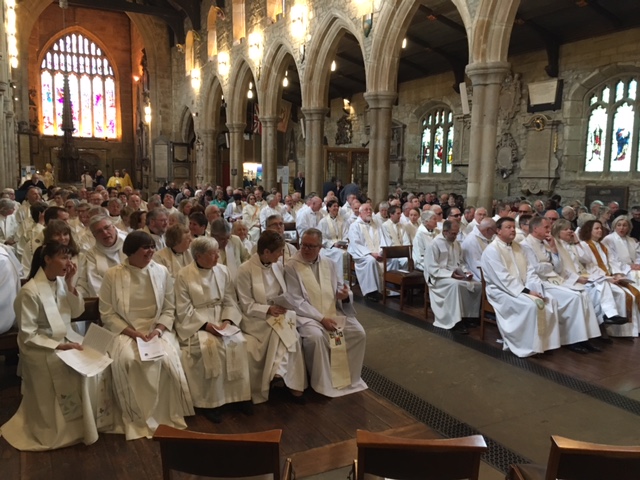
Today’s hymn from Sing Praise is “Redeemer, Lord, your praise we sing” by Michael Saward. The opening line is quite generic and suggests a hymn suitable for any occasion, but as John found when preparing today’s morning prayer, this is actually a very niche hymn, intended for the annual service of blessing of oils, which happens on Maundy Thursday (the day before Good Friday), usually in cathedrals. The Bishop blesses oil (traditionally olive oil from Israel/Palestine) and shares it among his or her parish priests to be used in their parishes in the coming year. The priests in return renew their vows of obedience to the Bishop and in the service of their congregation and community. So John is right, that it seems out of place to sing it even ten days early, in the context of private prayer or worship shared online.
Having said that, Covid has changed everything, and this year the Bishop of Leeds will bless the oil in Bradford Cathedral while the priests of the diocese join him on Zoom with their own supplies of oil to be blessed remotely. For a religion that believes in the power of prayer to heal the sick and otherwise change lives at a distance, that should not stretch our faith uncomfortably.
What is the blessed oil used for? Traditionally for three purposes: at baptism where the sign of the cross is made on the head of the person being baptised (referenced in verse 4, “From those baptised let Satan flee”); with prayer for healing of the sick (referenced in verses 2 and 3, “give oil for our infirmity… bring healing in a needful hour”) and the separately prepared and consecrated “chrism oil”.
The use of oil in healing is not confined to Christianity or even to religious practice, and indeed I understand that the Greek word used in James 5:14 (a key Biblical text here) is ‘aleiphantes’ which means something closer to ‘massaging’ than ‘anointing’. Oils (balm) were widely used in ancient times for medical purposes, and still are. The second verse of the hymn reminds us that olive oil is a natural product from a tree. The distinctive Christian element is to pray for God’s healing power to accompany medical treatment.
The other two uses, baptism and chrism, are more specifically religious. The sign of the cross in oil marks the baptised person as chosen by God to serve him in Christ as part of the fellowship of the Church. As to the Chrism, anointing the head with oil was (at least in Old Testament times) a sign of acknowledging a king or other leader as chosen by God, a tradition that has continued through the European monarchies. It is used on special occasions such as confirmation and ordination when someone is being specifically commissioned to a role in the Church.
So, not a hymn for today, but one to remember next week.
Yes, I ducked out of singing this hymn in Morning Prayer on the day on which Stephen had scheduled it, as I couldn’t see how to use it at a service at which oil wasn’t being blessed.
I have a lot of time for Michael Saward, and hymns like “Christ Triumphant” (no 267 in the book), “These are the facts as we have received them” and “Fire of God, titanic Spirit” will always command my respect. I think his career in broadcasting gave him many useful insights into communications which were a great asset to the church. But I must admit this hymn raised my eyebrows a little, written as it was with the explicit idea of “blessing” the oils. I’ve always been a little wary of the idea of God blessing things: in fact I subscribe to the view (now considered somewhat old-fashioned) that “God blesses people not things” (to which others retort that the bible does include formulae of God blessing things – but I reply that God always blesses things with the purpose of them being a blessing to people). I suppose I personally draw the boundary between what we can say and what we shouldn’t where the “blessing of rings” is expressed in the ASB marriage service: “Heavenly Father, by your blessing, let these rings may be to N and N a symbol of unending love and faithfulness, to remind them of the vow and covenant which they have made this day.” So if Michael had stuck to this kind of language, I would have been a lot happier with his hymn.
But then, I have the same problem with a lot of the language in hymns about baptism. I recently came across the following verse in a hymn –
These waters have no power, I know
to cleanse from sin or grace bestow.
‘Tis in obedience to my Lord
that I am blessed and he adored.
(“O Saviour Christ I now confess” by Glyn L Taylor,1986 – Mission Praise 519) – and sighed with relief that here was someone who could see through the trees and grasp the larger wood. Baptism is great as a sign and reminder of inner commitment and blessing. It’s terrible as a substitute for such.